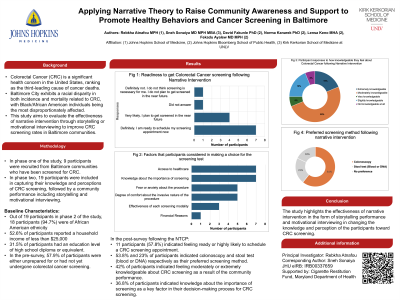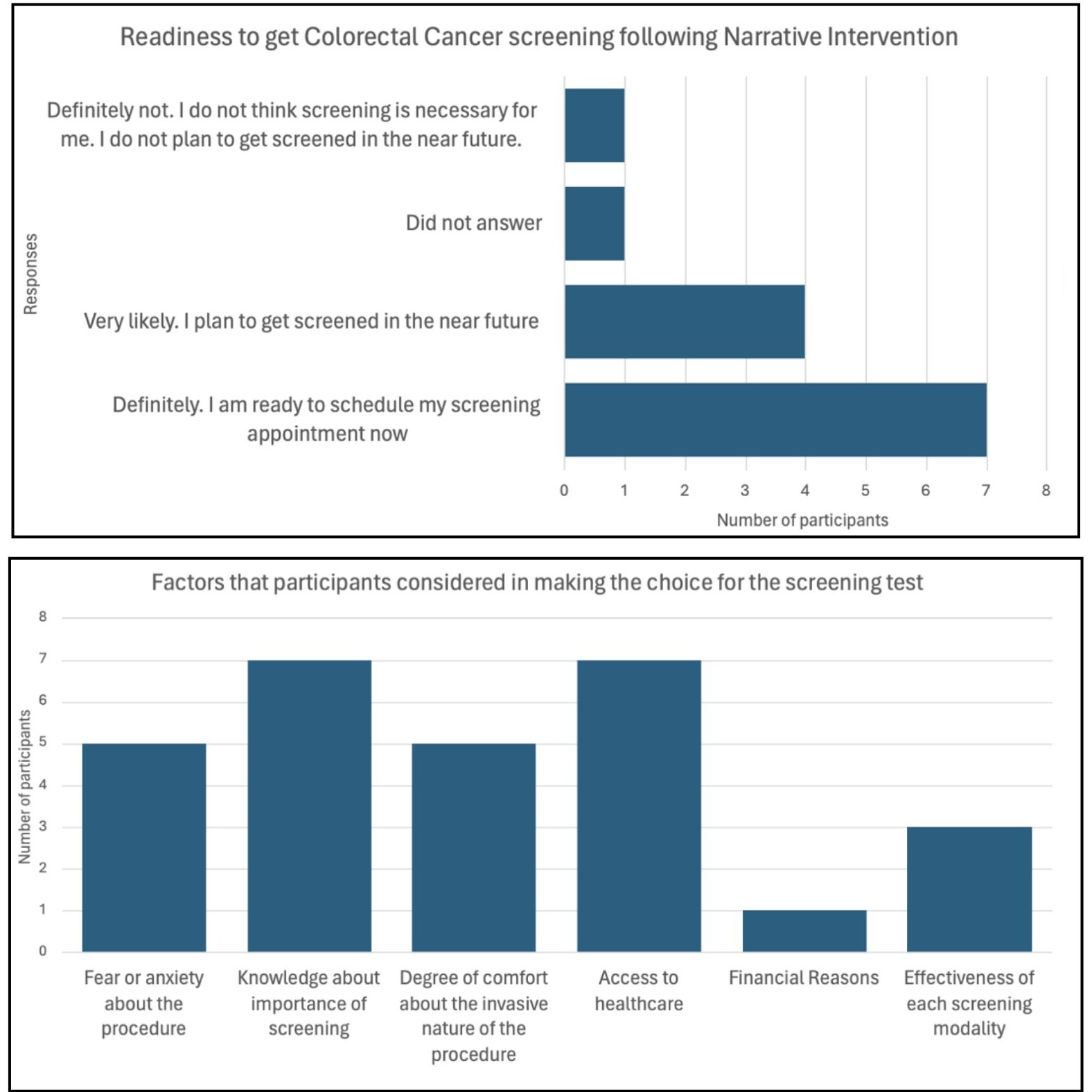Sunday Poster Session
Category: Colorectal Cancer Prevention
P0403 - Applying Narrative Theory to Raise Community Awareness and Support to Promote Healthy Behaviors and Cancer Screening in Baltimore
Sunday, October 27, 2024
3:30 PM - 7:00 PM ET
Location: Exhibit Hall E

Has Audio

Sneh Sonaiya, MD
Johns Hopkins University School of Medicine
Las Vegas, NV
Presenting Author(s)
Rebkha Atnafou, MPH1, Sneh Sonaiya, MD1, David Fakunle, PhD2, Norma Kanarek, PhD2, Lensa Keno, 1, Fekadu Ayalew, MD2
1Johns Hopkins University School of Medicine, Baltimore, MD; 2Johns Hopkins Bloomberg School of Public Health, Baltimore, MD
Introduction: Colorectal Cancer (CRC) is a significant health concern in the United States, ranking as the third-leading cause of cancer deaths. Baltimore City exhibits a racial disparity in both incidence and mortality related to CRC, with Black/African American individuals being the most disproportionately affected. This study aims to evaluate the effectiveness of narrative intervention in the form of storytelling or motivational interviewing to improve CRC screening rates in Baltimore communities.
Methods: In phase one of the study, 9 participants were recruited from Baltimore communities who have been screened for CRC. The participants were interviewed about their motivations for screening, challenges, the screening process and methods, and the overall experience with CRC screening. A storytelling performance was crafted based on the key themes from the participant interviews.
In phase two, 19 participants filled out a pre-survey questionnaire capturing their knowledge and perceptions of CRC screening, followed by a community performance including storytelling and motivational interviewing. After the performance and education session, participants filled out the post-survey questionnaire to assess changes in their understanding and attitudes toward CRC screening.
Results: Out of 19 participants in phase 2 of the study, 18 participants (94.7%) were of African American ethnicity; 52.6% of participants reported a household income of less than $25,000; 31.5% of participants had an education level of high school diploma or equivalent. In the pre-survey, 57.9% of participants were either unprepared for or had not yet undergone colorectal cancer screening.
In the post-survey following the community performance, 11 participants (57.8%) indicated feeling ready or highly likely to schedule a CRC screening appointment. 53.8% and 23% of participants indicated colonoscopy and stool test (blood or DNA) respectively as their preferred screening method. 42% of participants indicated feeling moderately or extremely knowledgeable about CRC screening as a result of the community performance, and 36.8% of participants indicated knowledge about the importance of screening as a key factor in their decision-making process for CRC screening.
Discussion: The study highlights the effectiveness of narrative intervention in the form of storytelling performance and motivational interviewing in changing the knowledge and perception of the participants toward CRC screening.

Note: The table for this abstract can be viewed in the ePoster Gallery section of the ACG 2024 ePoster Site or in The American Journal of Gastroenterology's abstract supplement issue, both of which will be available starting October 27, 2024.
Disclosures:
Rebkha Atnafou, MPH1, Sneh Sonaiya, MD1, David Fakunle, PhD2, Norma Kanarek, PhD2, Lensa Keno, 1, Fekadu Ayalew, MD2. P0403 - Applying Narrative Theory to Raise Community Awareness and Support to Promote Healthy Behaviors and Cancer Screening in Baltimore, ACG 2024 Annual Scientific Meeting Abstracts. Philadelphia, PA: American College of Gastroenterology.
1Johns Hopkins University School of Medicine, Baltimore, MD; 2Johns Hopkins Bloomberg School of Public Health, Baltimore, MD
Introduction: Colorectal Cancer (CRC) is a significant health concern in the United States, ranking as the third-leading cause of cancer deaths. Baltimore City exhibits a racial disparity in both incidence and mortality related to CRC, with Black/African American individuals being the most disproportionately affected. This study aims to evaluate the effectiveness of narrative intervention in the form of storytelling or motivational interviewing to improve CRC screening rates in Baltimore communities.
Methods: In phase one of the study, 9 participants were recruited from Baltimore communities who have been screened for CRC. The participants were interviewed about their motivations for screening, challenges, the screening process and methods, and the overall experience with CRC screening. A storytelling performance was crafted based on the key themes from the participant interviews.
In phase two, 19 participants filled out a pre-survey questionnaire capturing their knowledge and perceptions of CRC screening, followed by a community performance including storytelling and motivational interviewing. After the performance and education session, participants filled out the post-survey questionnaire to assess changes in their understanding and attitudes toward CRC screening.
Results: Out of 19 participants in phase 2 of the study, 18 participants (94.7%) were of African American ethnicity; 52.6% of participants reported a household income of less than $25,000; 31.5% of participants had an education level of high school diploma or equivalent. In the pre-survey, 57.9% of participants were either unprepared for or had not yet undergone colorectal cancer screening.
In the post-survey following the community performance, 11 participants (57.8%) indicated feeling ready or highly likely to schedule a CRC screening appointment. 53.8% and 23% of participants indicated colonoscopy and stool test (blood or DNA) respectively as their preferred screening method. 42% of participants indicated feeling moderately or extremely knowledgeable about CRC screening as a result of the community performance, and 36.8% of participants indicated knowledge about the importance of screening as a key factor in their decision-making process for CRC screening.
Discussion: The study highlights the effectiveness of narrative intervention in the form of storytelling performance and motivational interviewing in changing the knowledge and perception of the participants toward CRC screening.

Figure: Figure 1: Results from Phase 2 of the study
Note: The table for this abstract can be viewed in the ePoster Gallery section of the ACG 2024 ePoster Site or in The American Journal of Gastroenterology's abstract supplement issue, both of which will be available starting October 27, 2024.
Disclosures:
Rebkha Atnafou indicated no relevant financial relationships.
Sneh Sonaiya indicated no relevant financial relationships.
David Fakunle indicated no relevant financial relationships.
Norma Kanarek indicated no relevant financial relationships.
Lensa Keno indicated no relevant financial relationships.
Fekadu Ayalew indicated no relevant financial relationships.
Rebkha Atnafou, MPH1, Sneh Sonaiya, MD1, David Fakunle, PhD2, Norma Kanarek, PhD2, Lensa Keno, 1, Fekadu Ayalew, MD2. P0403 - Applying Narrative Theory to Raise Community Awareness and Support to Promote Healthy Behaviors and Cancer Screening in Baltimore, ACG 2024 Annual Scientific Meeting Abstracts. Philadelphia, PA: American College of Gastroenterology.
